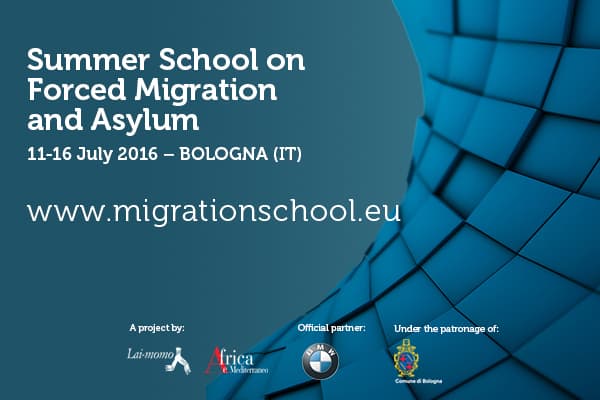Summer School on Forced Migration and Asylum 2017
[vc_row][vc_column][vc_single_image image=”21023″ img_size=”full” alignment=”center” onclick=”custom_link” img_link_target=”_blank” link=”http://www.migrationschool.eu/”][vc_column_text]The EJN took part in the second edition of the international Summer School on Forced Migration and Asylum, held from 3-8 July 2017 in Bologna, Italy. As in 2016, the EJN delivered a lecture and seminar on the day which the school will be dedicate to the topic of media and migration.
The EJN’s contribution to the event focused on two themes:
- Journalistic ethics applied to visual communication on forced migration.
- How can we understand and stop the spread of hate speech against migrants and refugees?
The session drew strongly on the EJN’s recent Ethics in the News report, which gave special attention to the issues of how refugee images are used by news media as well as hate-speech against migrants, as well as 2015’s Moving Stories report of how media cover migration. The EJN guidelines for reporting on migration and five point test for hate speech were also used as teaching tools.
The event was organised by Africa e Mediterraneo and Asylum Corner. For background and details about how to apply visit: http://www.migrationschool.eu/
Summer School on Forced Migration and Asylum:
A Multidisciplinary Approach
3-8 July 2017 – BOLOGNA (IT)
Why take part?
The Summer School, organised by two organisations active on the frontline of reception and integration of asylum seekers and supported by several public and private partners working in the field, will investigate a broad range of fundamental issues associated with the current phenomenon of forced migration adopting a methodological approach that is rooted in praxis.
Geopolitical, anthropological and cultural analysis of Countries of origin, labour integration of refugees in the European Member States, mental health and the treatment of illnesses caused by traumatic events experienced during the migration journey, are just some of the topics that will be analysed and discussed during the School. Lectures and seminars will be completed with field visits to reception centres, offering interventions and training about how reception and integration initiatives are conducted in the field.
For further information, please visit the Programme page.
Objectives
The theoretical and practical sessions of the School will offer thorough and multidisciplinary training on several aspects of migration. The contents of the classes will touch upon five principal broad topics, which will be the starting points for further discussions between participants and lecturers. This year, the Summer School will focus on:
- Countries of origin
- Labour integration of refugees
- Circular migration and voluntary returns
- Mental health and therapeutic assistance
- Communication on migration and hate speech
The training will provide new perspectives and enhance the effectiveness of those who work, or who are willing to work, in the professional sector of the reception and integration of migrants, as well as in social communication and in academic research related to this topic. Moreover, participants will be able to share their practical and academic experiences during specific sessions dedicated to networking, with the aim of establishing fruitful relations among people active in the field at the international and local level.
Beneficiaries
The ideal candidates for the Summer School are researchers, journalists, experts and social workers who work in the field of migration and communication, Masters students. All panels will be conducted in English.
Please go to the Fee and Registration page for further details.
EJN workshop on Migration Reporting 2016
 The Ethical Journalism Network’s director, Aidan White, participated in the Africa e Mediterraneo and Lai-momo Summer School on Forced Migration and Asylum that will be held in Bologna, from 11th to 16th July 2016.
The Ethical Journalism Network’s director, Aidan White, participated in the Africa e Mediterraneo and Lai-momo Summer School on Forced Migration and Asylum that will be held in Bologna, from 11th to 16th July 2016.
The Summer School, which received the support of several partners committed in the field of asylum and integration, formed a deep analysis of some fundamental issues associated with the current forced migration phenomenon paying specific attention to the importance of a methodological approach directed towards praxis. International experts, academics and professionals in the field guided the participants during 5 days of intensive training, spurring a fruitful debate and the sharing of experiences, best practices and perspectives, aiming to produce new knowledge and connections between the people involved in the field.
The School’s classes on asylum were taught by 18 lecturers, international experts and professionals of this area of asylum amounting to 34 hours of training of 6 days for the 53 asylum social workers, students, members of international organisations and NGOs, as well as employees of public, national and European administrations who attended.[/vc_column_text][/vc_column][/vc_row]